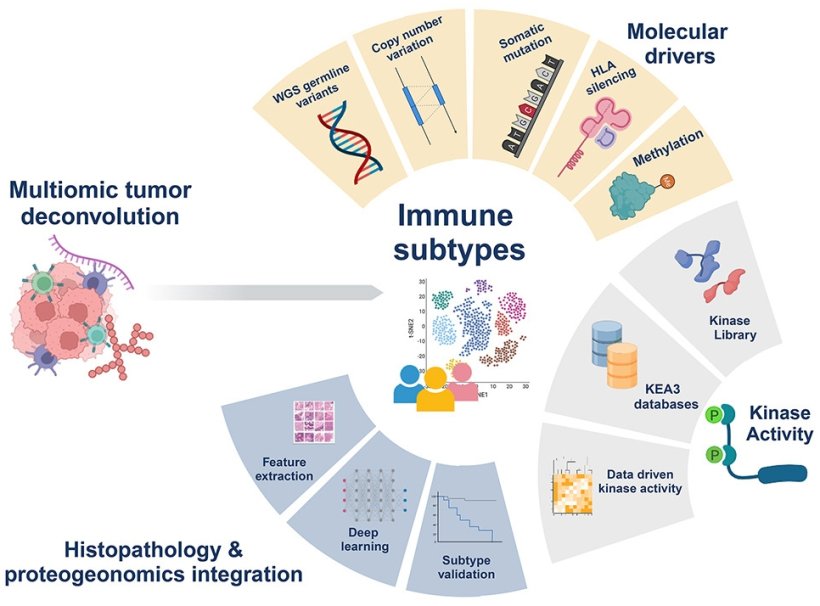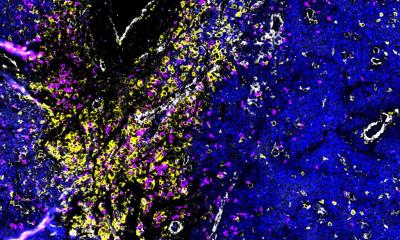
Image source: Petralia et al., Cell 2024 (CC BY-NC-ND 4.0)
News • Pan-cancer proteogenomics
Characterizing the immune landscape in cancer
New study is the first to integrate DNA, RNA, and proteomics, revealing the complex interplay of immune cells in tumors.
The findings were published in Cell.
Utilizing data from more than 1,000 tumors across 10 different cancers, the study is the first to integrate DNA, RNA, and proteomics (the study of proteins), revealing the complex interplay of immune cells in tumors. The data came from the Clinical Proteomic Tumor Analysis Consortium (CPTAC), a program under the National Cancer Institute. "We aimed to improve our understanding of the mechanisms underlying the functional impairment of immune response in tumors. By closely examining genes and proteins in the tumor tissues, we discovered various patterns in immune activation and suppression," says Pei Wang, PhD, Professor of Genetics and Genomic Sciences at Icahn Mount Sinai, and the lead-corresponding author on the paper. "Our goal in unraveling these diverse immune subtypes is to help clinicians identify patient groups more responsive to immunotherapy. Revealing the specific pathways and cellular switches for each subtype can also spark new and creative ways to develop treatments."
With phosphoproteomic profiling of more than 1,000 pan-cancer tumors, we were able to computationally discover a set of key novel drug targets
Avi Ma’ayan
"Each type of immune response was linked to changes in gene functions, such as how genes are modified, the messages they send, and the proteins they produce. By providing a comprehensive molecular fingerprint of the immune response in cancer, this study is expected to facilitate the development of future immunotherapy strategies," says Francesca Petralia, PhD, Assistant Professor of Genetics and Genomic Sciences at Icahn Mount Sinai, and co-corresponding author on the paper.
A key finding was that among seven subtypes identified through advanced statistical models, five included tumors from ten different types of cancer, suggesting shared immune responses across these tumors. “When we see common immune responses and similar patterns in the way cells behave across various cancers within the same immune group, it hints that certain treatments that boost the immune system could work well for many types of cancer," says Dr. Wang.
A novel aspect of the research stems from the deep phosphoproteomic data generated for more than 1,000 tumors. This data allows researchers to see how proteins are modified. “With phosphoproteomic profiling of more than 1,000 pan-cancer tumors, we were able to computationally discover a set of key novel drug targets,” says Avi Ma’ayan, PhD, Professor, Pharmacological Sciences, Director of the Mount Sinai Center for Bioinformatics at Icahn Mount Sinai, and a senior author of the paper. “By targeting selected kinases with small molecules or other means, we may be able to convert tumors not responding to immunotherapies into tumors with better immune-therapy response.”
As part of the research, a machine-learning tool applied to digital pathology images also demonstrated correlations between different types of immune responses and the presence of certain immune cells, enhancing understanding of the environment in and around tumors.
Next, the investigators plan to validate their findings further and leverage insights in ongoing clinical studies focused on immunotherapies. This effort aims to streamline the development of biomarker panels for treatment responses and identify enhanced treatment strategies. Collaborative efforts within CPTAC are underway, including a proteogenomic study on molecular mechanisms underlying responses to immune checkpoint treatments in melanoma patients.
Source: Mount Sinai School of Medicine
14.02.2024











